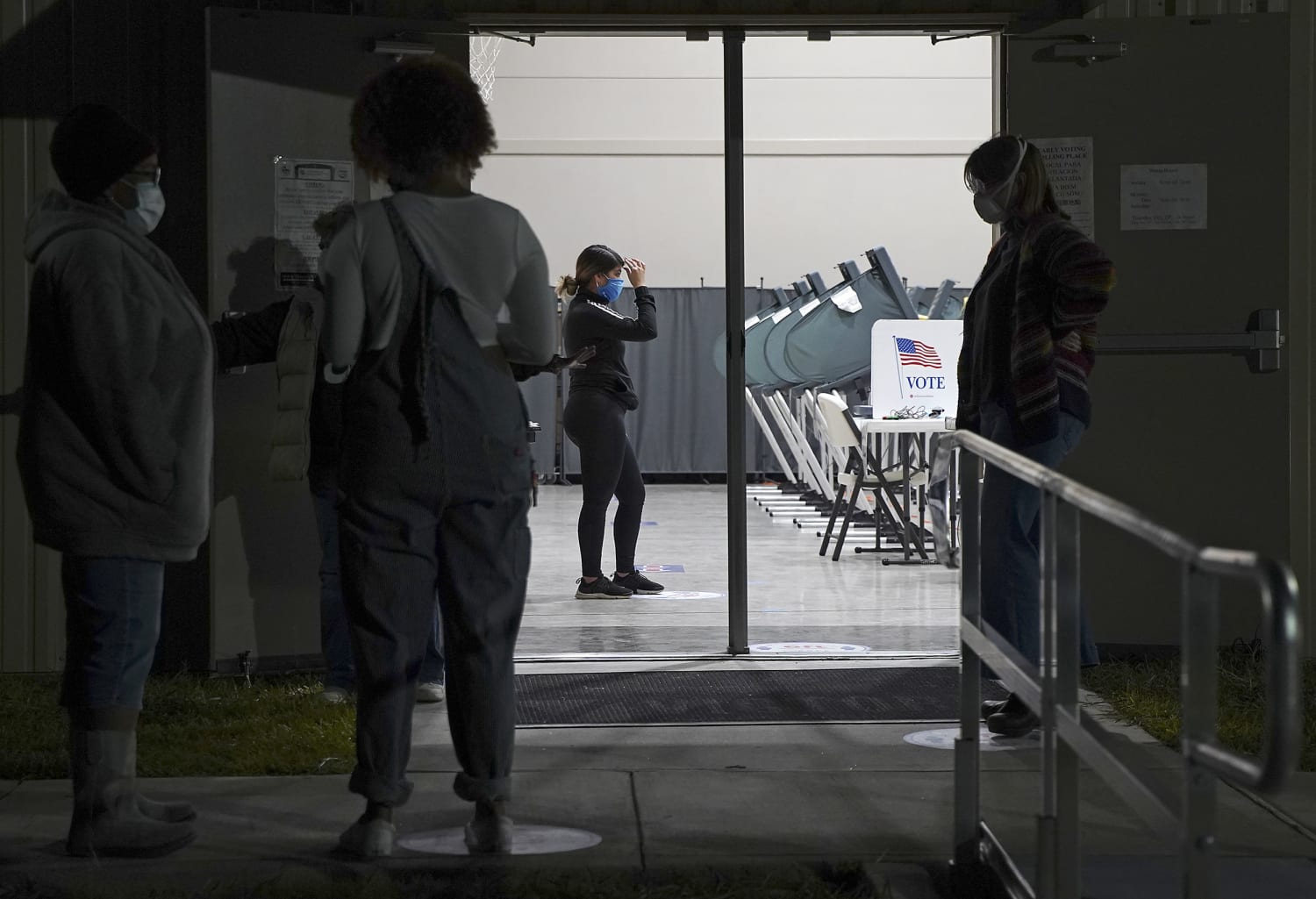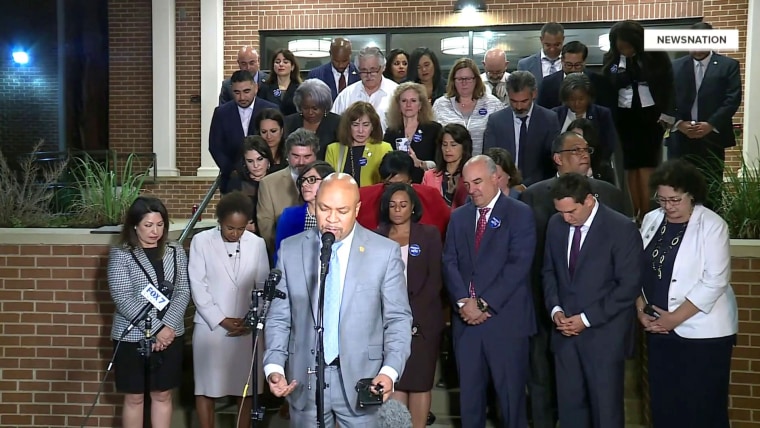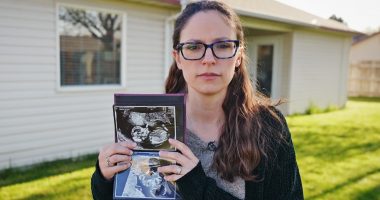The Texas Democrats who blocked a Republican-backed voting restrictions bill from becoming state law at the eleventh hour last month will head to the U.S. Capitol on Tuesday to lobby senators as part of a broader, last-ditch effort to rally support for a major voter rights bill.
Nearly two dozen state Democrats plan to lobby senators in behalf of the For the People Act, a broad bill that would create a federal floor of voting rights access and kneecap laws like the one proposed in Texas and already enacted in other Republican-led states.
The schedule is still in flux, but a source with knowledge of the plans said the Texas legislators are scheduled to meet with Democratic Sens. Amy Klobuchar of Minnesota and Jeff Merkley of Oregon and Republican Sens. Ted Cruz and John Cornyn, both of Texas. They will also meet with House Speaker Nancy Pelosi, D-Calif., and hope to meet with Sen. Raphael Warnock, D-Ga., in their push for federal voting rights legislation.
They will head to the White House for a previously announced meeting Wednesday with Vice President Kamala Harris, who is leading the Biden administration’s push to protect voting rights.
“This is, in my mind, a now-or-never moment. It’s an all-hands-on-deck moment,” state Rep. Trey Martinez Fischer said Sunday. “On that last day” of the Texas House session, “on that gloomy Sunday, we knew we didn’t have the votes, but we found a will, and we found a way.”
Voting rights activists and Democrats in Washington and beyond have argued for months that it is time for the Senate to eliminate the filibuster — the 60-vote threshold needed to pass legislation — to get the For the People Act and other parts of President Joe Biden’s agenda through the closely divided Senate.
But moderate Democrats, including Joe Manchin of West Virginia, have repeatedly said they aren’t on board with changing Senate rules. The For the People Act isn’t backed by any Republicans, and in a recent opinion piece, Manchin firmly opposed the legislation, citing its lack of bipartisan support. Without GOP votes and without eliminating the filibuster, the bill, filed as H.R. 1, is all but dead.
Even so, advocates who see the bill as their only hope of countering Republican-led election limits say they’re not ready to throw in the towel.
“We can’t take no for an answer,” said Rahna Epting, executive director of MoveOn, a progressive group. “If anything, Manchin raised the stakes on how much energy we’re putting into this.”
In interviews, more than a half-dozen prominent advocates of the legislation promised more lobbying, marches and ad campaigns and a summer of pressure that would seek to persuade Manchin and others to defy Republican opposition, change the filibuster rules and pass the legislation.
Beto O’Rourke, the Texas Democrat who narrowly lost a Senate race in 2018 and has been hosting voting rights events around the state, said he believes the group will bring “much-needed courage and backbone” to the fight in Washington this week.
“I hope those Texas state House Democrats are able to show their colleagues in the U.S. Senate the way to fight,” he said Sunday.
He said he plans to draw more than 10,000 voters for a rally Sunday night at the Texas Capitol in Austin, featuring the Texas legislators after their week of lobbying in Washington. The Senate is expected to vote on the For the People Act for the first time next week.
“It is absolutely clear that only Congress can definitively stop this vote suppression and restore fair elections,” said Wendy Weiser, vice president of the Democracy Program at the Brennan Center for Justice at the New York University School of Law.
Nsé Ufot, who leads the New Georgia Project and is working with advocates in West Virginia to pressure Manchin at home, said Manchin’s op-ed was “a sign that it’s time to escalate, not that the fight is over.”
“I refuse to believe that one conservative Democrat is literally what is going to bring down the entire American government and the sort of 200-plus-year experiment in democracy,” Ufot said.
Stacey Abrams’ Fair Fight Action is reported to be planning a “Hot Call Summer” effort, with plans to text 10 million people in states with voting restrictions on the books or under consideration, to rally support for the For the People Act.
Black Voters Matter is kicking off a bus tour dubbed the Freedom Ride for Voting Rights from Mississippi to Washington, D.C., this month, a nod to the Freedom Rides of the 1960s civil rights movement.
A prominent civil rights leader, the Rev. William J. Barber II, is organizing “moral marches” in West Virginia on Monday and in Washington next week. Civil rights leaders, including NAACP President Derrick Johnson, urged Manchin to come around in a meeting last week. Manchin said his position was unchanged.
The need for federal voting rights legislation is “existential to our democracy, and also, this is existential for the continued ability for Democrats to hold power,” said Maurice Mitchell, national director of the Working Families Party.
The For the People Act has been a Democratic priority since it was introduced in 2019, but the stakes have risen considerably. It passed the House along party lines in March, but it has languished in the Senate since then.
As former President Donald Trump continues to push the lie that the election was stolen from him — and polls show that a significant number of the Republican Party’s voters believe him — Republicans, who control the majority of state legislatures, have moved to enact a number of restrictive laws. Critics have argued that the laws are a backlash to the diverse coalition that powered President Joe Biden’s election victory and that they will particularly suppress key Democratic constituencies, including Black and Latino voters. Republicans say the new limits are needed to restore trust in the country’s elections.
Legislators have introduced at least 389 bills with restrictive election provisions in 48 states, according to the Brennan Center for Justice’s most recent tally.
After weeks of fighting and using parliamentary tools to delay a vote, the Texas Democrats staged a late-night walkout in the final moments of their legislative session last month. The rare, dramatic move prevented a vote on a restrictive bill advanced by Republicans, temporarily killing the bill. The bill is expected to be introduced again by Republicans, who say they’ll pass it in the late summer.
Conservatives have balked at the federally mandated changes to state-run elections in the For the People Act, arguing that states should be able to administer elections as they see fit. And while the spate of restrictive election laws has become a key selling point of the legislation, the massive bill extends far beyond ballot box access. The For the People Act would completely overhaul campaign finance regulations in America and create public funding for congressional campaigns, too.
Manchin said in his op-ed that he was open to H.R. 4, the John Lewis Voting Rights Advancement Act, a narrower piece of legislation that would reinforce the Voting Rights Act of 1965, but it, too, lacks broad bipartisanship. Just one Republican senator, Lisa Murkowski of Alaska, supports the bill, and Senate Minority Leader Mitch McConnell, R-Ky., said recently that he wouldn’t support it, calling it “unnecessary.”
Advocates say time is of the essence.
“We’re also racing against a clock. It’s not just the clock for the 2022 elections. There’s a much sooner alarm, which is the redistricting cycle, which, in some jurisdictions, the line-drawing is going to start in mid-August,” Weiser said. “The voting crisis isn’t the only one that is a ticking time bomb.”
Republican lawmakers control more of the 2021 redistricting process than Democrats, and voting rights advocates say they believe they could gerrymander a House majority in 2022.
Advocates stress that challenging voting infringements and gerrymandered maps in the courts — a longtime fallback — isn’t enough to protect voting rights. Challenging restrictive voting laws is time-consuming and expensive, and the outcomes are uncertain, they said. Nonetheless, advocates have filed a number of suits against the restrictions passed in states this year.
“We need to fight it in the courts, but we can’t count on the courts,” said Tiffany Muller, president of the End Citizens United and Let America Vote Action Fund.
A top Democratic election lawyer, Marc Elias said, recently in a livestream posted to YouTube, “We cannot rely on lawyers like me and the courts to solve all of the democracy problems and struggles that we see in front of us.”
Elias, who is fighting election-related litigation in 18 states and Washington, D.C., said the litigation is “buying time for democracy” so Congress can pass voting rights legislation.
Source: | This article originally belongs to Nbcnews.com











